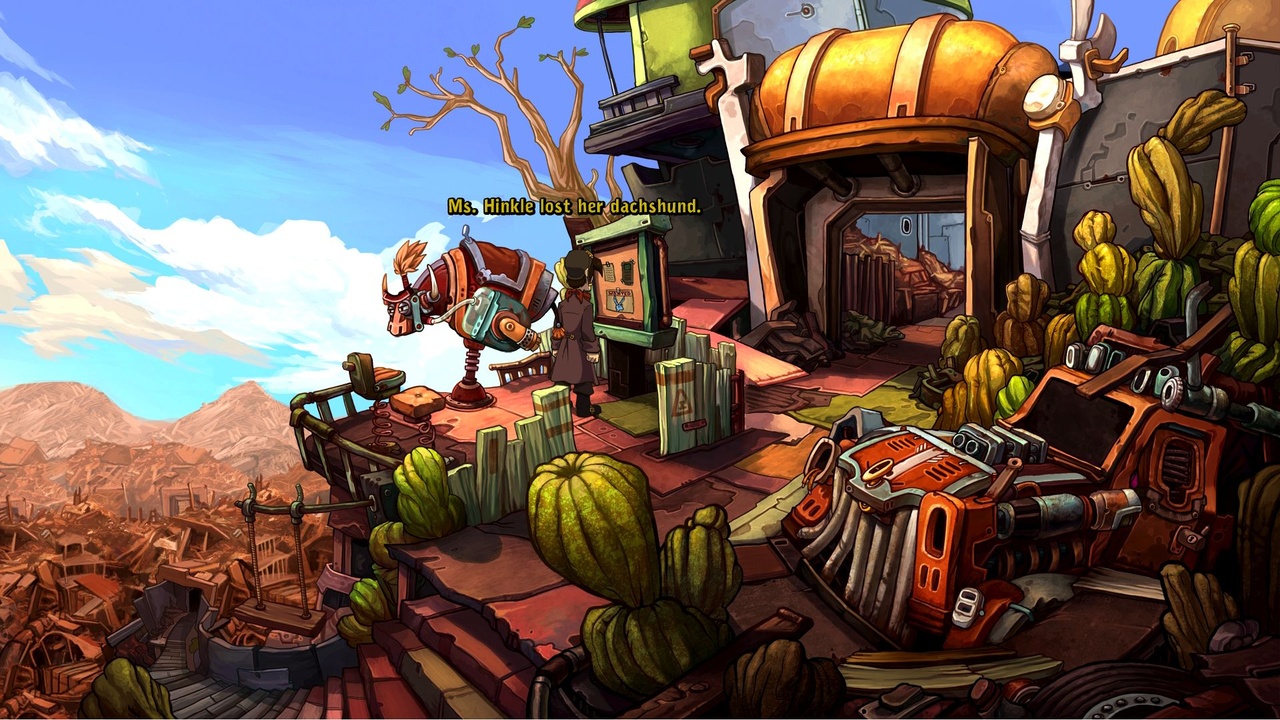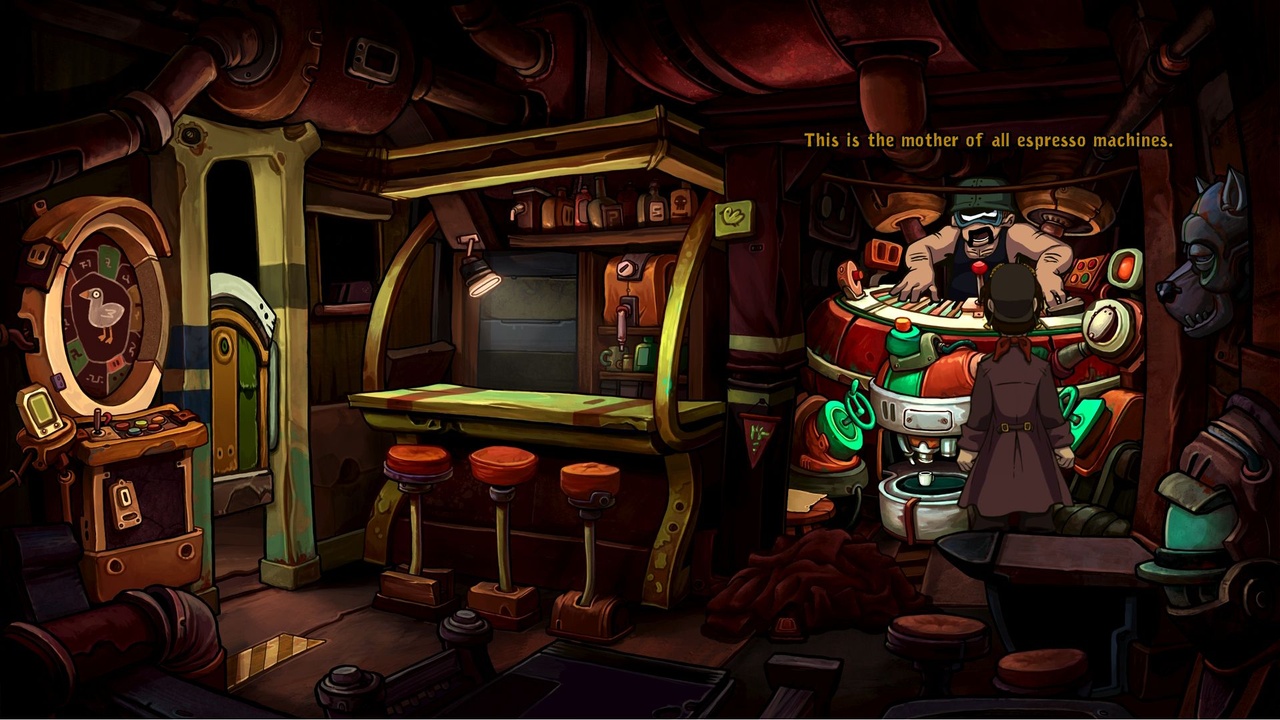Deponia is, at its heart, a love story--a tale of boy meets girl. The boy, Rufus, is a dreamer, the archetypal down-on-his-luck underdog who aims high but fails oh so miserably time and again. The girl, Goal, is classically unobtainable--rich, pampered, spoiled, and blissfully unaware of her own attractiveness to the opposite sex. Oh, and she has a removable chip in her head, lives in a floating palace in the sky, and has the power to blow up the entire planet. No, this isn't the most conventional of love stories, but such wackiness is befitting for a game that is as much about providing oodles of comic relief as it is about telling the tale of two lost souls.
And wonderfully told it is too, full of the sort of dry humour and wry writing that have formed the backbone of LucasArts' best point-and-click games. Indeed, Rufus is very much the modern-day Guybrush Threepwood--a self-centred, sarcastic, naive layabout who's so full of character that the mere raise of an eyebrow is enough to cause a chuckle. Though he's an unemployed slob, it's hard to dislike him, mostly thanks to the many hardships he's forced to endure. There's no clean water; he lives atop a stinking pile of trash; and worst of all, he does so with an ex-girlfriend who by all accounts is the scariest, not to mention the angriest, woman on the planet of Deponia.
It's no surprise, then, that Rufus longs to leave it all behind. A solitary wall in his messy attic bedroom is strewn with scrapped plans of escape that never came to fruition. Now he has a new "foolproof" plan, and it's up to you to help put it into action. And to kick things off, you tackle the scourge of holidaymakers and business travellers the world over: packing. Fortunately, Rufus takes the Up in the Air approach to packing--minus the coldhearted handsomeness of George Clooney of course. There are just four items scrawled onto a piece of paper to retrieve, all of which are scattered around the messy apartment.
It's a gentle introduction to the simple point-and-click mechanics of Deponia, which encourage you to click on anything and everything. Most objects can be fiddled with in some way by looking at them, picking them up, or combining them with other objects, which often results in a cheeky quip from Rufus himself: "That explains why I've had such cheesy dreams," he remarks as you remove a mouldy sock from underneath his pillow. What makes such exploration all the more enjoyable is the animation, which is absolutely charming and a joy to look at. It's full of little details like cute rusty robots that fly across the screen and precarious junk piles that topple over as you walk past, bringing each scene to life.
The only downside to the wonderful animation is that it's often difficult to pick out objects you can interact with, given that they blend so neatly into the background. Rather handily, you can press the spacebar to highlight all the interactive objects in a scene, but oddly, this rather useful feature isn't pointed out to you at all during the game. Objects that you pick up like Rufus' mouldy sock are placed into your inventory, which means that yes, you have to make sure you pick up everything in a given scene, lest you have to trek back for it later in order to solve a puzzle.
Fortunately--with only a few exceptions--puzzles make practical sense, rather than the often ludicrous video game sense that dictates that a sheet of prosthetic skin, a sword, and a manhole make for a great trampoline (Escape From Monkey Island) or that a combination of bread, a seagull, and a rubber duck is an ideal tool for retrieving lost keys (The Longest Journey). Therefore, they're very enjoyable: combine an empty jar with crumbs on the sofa, and you get rations for your journey. Stick a pot of water and detergent on the stove, and you've got the ideal way to clean those socks. Put a parrot in front of a phone box after leaving it with your ex girlfriend for a day, and you've got the ideal way to prank call the police…OK, maybe not that last one.
Still, while some puzzles leave you scratching your head in confusion for a while, the mostly sensible solutions make for a satisfying experience. Breaking up all the object puzzling are simple minigames, such as solving a jigsaw of broken mosaic pieces, or testing your spatial awareness with rotating block puzzles. There's even the odd conversational puzzle to deal with too. A process of trial and error means they're hardly taxing, but thanks to some fantastic writing and voice acting and the collection of characters, those exchanges are wonderfully entertaining. Best of all is an exchange with a malfunctioning postal robot that mixes clever wordplay with a ludicrous subject for a charmingly funny and increasingly complex barrage of rhyme.
Underpinning the puzzles is that love story narrative that proves to be as compelling as it is funny. There's no greater drive than that of true love, and as the game progresses, so too do the characters. Rufus becomes less egotistical. Goal learns to appreciate the "little people." Both of them learn to love each other. And while Rufus' harebrained schemes don't exactly work out, you're always rooting for him, no matter what idiotic plan he hatches. Such strong characters make for a confidently cohesive experience, and even if you don't find the notion of true love a draw, there's an overarching power struggle taking place between the poor people of Deponia and the wealthy folk who live in the sky above to see you through.
Unfortunately, it all ends rather abruptly. Just as things really begin to heat up and you think the many questions raised are to be answered, the game stops. It's a crushing disappointment. To add insult to injury, the game flashes up a "The End…?" title, just to let you know that yes, there is more, but no, you won't get it here; you'll likely have to pay for it later. And yes, if you play Deponia, you're really going to want to. This is one of the best traditional point-and-click games out there--it oozes charm, keeps the puzzles sensible, and boasts a story that makes you laugh and warms your heart.
'




